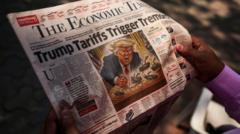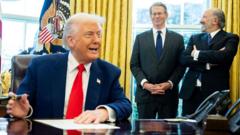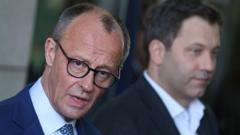A snap election in Germany will take place on February 23, following the dissolution of Chancellor Scholz's coalition government.
German Lawmakers Set Snap Election Date Following Coalition Collapse

German Lawmakers Set Snap Election Date Following Coalition Collapse
Lawmakers agree on February 23 for early elections amidst economic concerns and political shifts.
On November 12, 2024, the German Bundestag announced a date for a snap election, set for February 23, 2025, after Chancellor Olaf Scholz's three-party coalition disintegrated over budget disputes. This early election arrives approximately seven months ahead of the previously scheduled polling date. The decision was facilitated by an agreement between Scholz's Social Democratic Party (SPD) and the main opposition, the conservative Christian Democratic Union (CDU), as both sides ramp up their electoral campaigns.
The coalition's breakup followed significant political maneuvering, including the dismissal of Finance Minister Christian Lindner, leader of the pro-business Free Democratic Party (FDP). This shake-up left Scholz's government in a precarious position, lacking the parliamentary support needed to pass crucial legislation. While the chancellor had initially hinted at elections in March, the opposition argued that the need for immediate elections was vital, claiming that a minority government could lead to legislative gridlock.
As the election date looms, German leaders are preparing for an intense campaign focused on revitalizing a struggling economy and grappling with the implications of a potential second term for former U.S. President Donald J. Trump. In a recent televised interview, Scholz expressed his intention to seek reelection, emphasizing his commitment to leading the SPD through these turbulent times. The upcoming election is poised to reshape Germany's political landscape, presenting significant stakes for both the governing party and the opposition.
The coalition's breakup followed significant political maneuvering, including the dismissal of Finance Minister Christian Lindner, leader of the pro-business Free Democratic Party (FDP). This shake-up left Scholz's government in a precarious position, lacking the parliamentary support needed to pass crucial legislation. While the chancellor had initially hinted at elections in March, the opposition argued that the need for immediate elections was vital, claiming that a minority government could lead to legislative gridlock.
As the election date looms, German leaders are preparing for an intense campaign focused on revitalizing a struggling economy and grappling with the implications of a potential second term for former U.S. President Donald J. Trump. In a recent televised interview, Scholz expressed his intention to seek reelection, emphasizing his commitment to leading the SPD through these turbulent times. The upcoming election is poised to reshape Germany's political landscape, presenting significant stakes for both the governing party and the opposition.






















